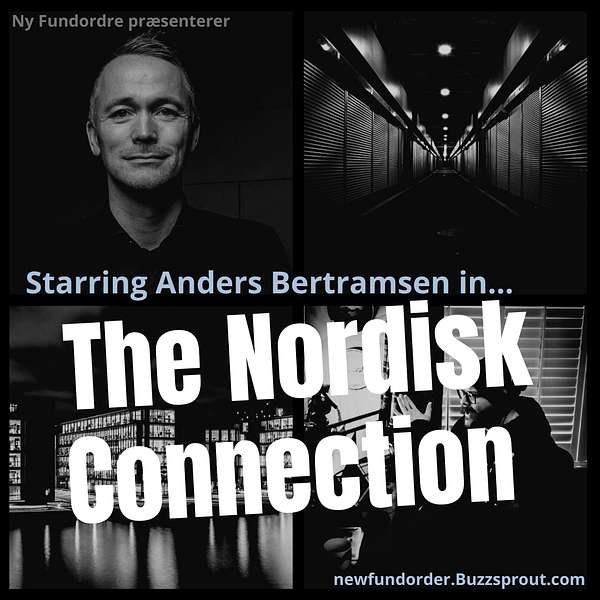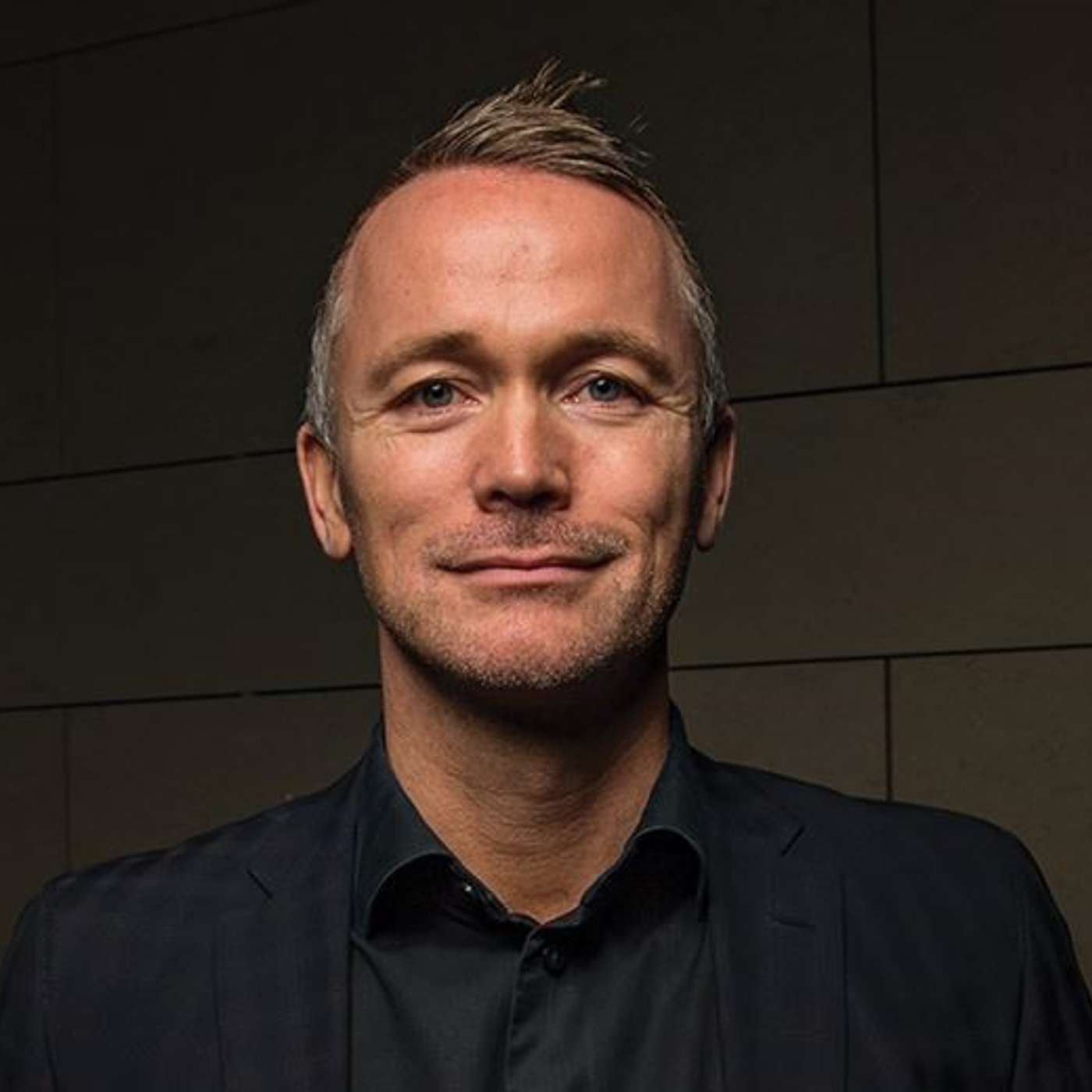
The New Fund Order
Deep from inside the City's shadows... author, speaker, NED and ex investment gatekeeper Jon 'JB' Beckett explores the Industry's taboo and hot topics. Dear Citizens of the People's Republic of Podcast, welcome! The New Fund Order is here; from existential risk to the human condition, a contrarian exploration of the Darkside, the Frontier and the Fringe of; Asset Management, Finance, Fintech, Mutual Funds and Macro. Bringing you news, views and interviews. Like a philosophy-economics mash up with science fiction, B-movies, Kung Fu films, cold war spy films, to Spaghetti Westerns... all delivered from the left-field with an Orwellian chill.. #newfundorder ALL VIEWS ARE INDEPENDENT. PLEASE check out my book website: https://www.blurb.co.uk/b/7337318-newfundorder-2-0 and Youtube channel https://www.youtube.com/channel/UClzN8gpccuVtdfW47TM_pPQ Season 2 ‘Fight Club’ is here ...
The New Fund Order
The Nordisk Connection: The Scandi-fication of Finance
Welcome to the New Fund Order. An Orwellian journey into the Darkside, the Frontier and the Fringe of Finance.
Ny fondordre
Episode #15
The water ripples as the air chirps to the sound of bicycles. It could only be Copenhagen! I sit down and discuss what makes fund selection different in Denmark and the wider Scandi-fication of wealth management across Europe and beyond. We tackle ESG, diversity, quantification and the introduction of ETF products. A fascinating and insightful discussion, framed by the unexpected Russian tones of Leon Trotsky, during his stay in Copenhagen, on the future of Europe and balance of global power.
With Anders Bertramsen, Head of External Products NAM
"I have the privilege of managing a small group of highly skilled investment professionals based in both Copenhagen and Stockholm." Previously Anders was with Handelsbanken, Lærernes Pension, Kirstein Finansrådgivning. Currently with Nordea Asset Management (NAM), part of the Nordea Group, the largest financial services group in the Nordic region.
'In Defence Of October'
A speech delivered in Copenhagen, Denmark in November 1932
Leon Trotsky: In Defence Of October (1932)
His views will surprise many. See the film on YouTube here: https://youtu.be/WiK_8YD6ob8
"In 1935 Trotsky was compelled to move to Norway, and in 1936, under Soviet pressure, he was forced to seek asylum in Mexico, where he settled at Coyoacán. He was represented as the principal conspirator, in absentia, in the treason trials of former communist opposition leaders held in Moscow (1936–38). The evidence of treasonable plotting, however, was later proved to be fictitious. Leon Trotsky - Exile and assassination | Britannica
Together with left-field opinion, global market news and latest views, direct from my dystopian bunker. In association with my sponsor Allianz Global Investors (AGI) one of the world's leading active managers. My thanks to my guest Anders.. and you dear listener.
Please LIKE, SHARE and SUBSCRIBE. Please leave a REVIEW and let me know what you think and what topics you would like for future episodes. Until then... stay safe and.. keep it left-field!!
That's 20 episodes, 20 Guests, every 2 weeks... each episode is 25 minutes!
Join the NFO Army Citizen, https://www.patreon.com/newfundorder
Left-field Finance.
#newfundorder
Credits
Market News from the Financial Services Club. Go to https://fsclub.zyen.com/
George Orwell 'Nineteen-Eighty Four', Public Domain 1.0.
Audio clips: Public domain 1.0. Archive.o
Active is: Allianz Global Investors.
Disclaimer: This post contains affiliate links. If you make a purchase, I may receive a commission at no extra cost to you.
Clip (Trotsky in Copenhagen 1932) 0:01
The present crisis will mean a new era in history.
JB Beckett 0:06
Salutations Dear citizens as we peer into the new fund order to discover the immutable truth for asset management and wealth managers. The lowdown from the dark side, the frontier on the fringe of asset management on fund research.
Clip (Trotsky in Copenhagen 1932) 0:24
You face is not a stable world, the middle of Europe has become a bit of a formless thing.
JB Beckett 0:38
A podcast for wealth managers fund selectors, distributors and investors. Bringing to you the People's Republic podcast on finance, in association with my sponsor, Allianz global investors, capturing the latest market news, views and interviews with leading minds in our industry,
Clip (Trotsky in Copenhagen 1932) 0:58
Europe in general, has ceased to be the centre of the world. It is foolish to hope that Europe as it is, here again, occupies that position.
JB Beckett 1:11
Allianz Global Investors is one of the world's leading active managers,
Computer 1:15
Market news.
JB Beckett 1:16
And this week's market news comes from the financial services club. The first story being Johnson and Sunak in the UK are urging UK pension providers to bank riskier investments. No doubt this is correlated to LTAF proposals by the Financial Conduct Authority. Boris Johnson and Rishi Sunkak will urge UK pension schemes to back Britain's entrepreneurial spirit with billions of pounds of savers funds to fuel the economy's post pandemic.
Meanwhile, Robin Hood shares surged amid frenzy trading after a pure stock market debut, amateur investors are snapping up shares in the online trading platform.
The FS Club pick up on the FT story 'computer driven funds to muscle into new markets', say Man Group CIO Sanjay Rattray predicts quantum invasion in corporate debt and private equity. Rattray said the coming decade or see 'quants' which use data and systematic computer driven models to make ivestment decisions seizing more territory and areas of finance have been considered treacherous terrain for algorithmic strategies.
And Lastly, French fund manager to launch first EU regulated BitCoin tracker, Melanion Capital seeks to tap into the booming crypto interest with new UCITS vehicle.
..and that's the market news tag hashtag new fund order and tell me what stories you want to hear.
And in these strange pandemic lockdown times. Rest assured that all guests are calling in remotely
Computer 2:35
interview
JB Beckett 2:37
..and welcome to the new fund order Anders. I want to explore what makes fund selection and allocation different in Denmark in the Nordics. That Scandi-fication of Finance, if I may put it that way. Welcome to the new fund order.
Anders Bertramsen 2:53
First and foremost, thank you so much. Thank you so much, JB I'm thrilled to be on a selection different in the Nordics.
That obviously would require that I have deep knowledge about what goes on into other countries. I think one way may differentiate or at least it used to differentiate is that I think the Nordics and probably also the melons were probably first into having the ESG mindset and the ESG agenda and starting also on the fund selection side and the manager selection side to evaluate ESG somewhat more diligently. I think the rest have caught up now but but maybe there's still some element of further scrutinise ation on the ESG elements. I think in some cases, there is very little it's it's not common to use consultants in the Nordics.
So there are local consultants, but it is not like it is not as consultancy driven, as for instance in the UK market where consultants play a lot bigger role. So in that sense, there is a little bit more of a sort of 'do it yourself' mentality and being close to you know, having the capabilities in house instead of having having goes off source to consultants.
When it comes to different asset classes, even though Scandinavia is a small sort of region, you know, there's certainly local differences. Usually I sort of say that the Danes and the Finns are a little bit more fixed income oriented, whereas the Swedes and the Norwegians tend to, or at least historically, have more of an equity preference and so faces high yield was was quick to come into the Danish investors offering whereas in Sweden, it was quite late but on the other hand, the Swedes were early into private equity and more sort of esoteric equity products. So even within small countries, there are actually quite significant local nuances to it. So it's it's difficult to find one size fits all..
JB Beckett 5:12
Right, yeah, it's difficult to guess to generalise. I think that's a good point well made. Picking backing back up on that, that ESG, as you say, and in many of the countries in in the Nordics, they were already progressing many of these considerations, but of course, what we've seen in the last couple of years - is the agenda has been escalated to a political level that the EU is now deciding, I think on on many of these factors. Does that create challenges for fund selectors where you are in trying to adapt, I guess, to that to that new EU green framework?
Anders Bertramsen 5:55
Yes, it creates a lot of challenges. So just to be very frank, and clear, I support the ambition of the EU and what they would like to do and but obviously, the devils in the detail, and ESG is not black and white, obviously, you can all point to one or two companies that is like 100%, black or 100% Green, but then there is the rest of the universe, which has elements of both good and bad, bad stuff combined. I think if you take the the SFDR in the articles, the article six, eight and nine funds, it's still very much up to the interpretation of the asset managers currently to self classify as either six, eight or nine. And obviously, you will, you will see funds that, you know, could theoretically have the exact same holdings. But one manager will classify it as an article six, because they have a higher bar and another manager will put it as an eight, because they said they'll have a lower bar what they will constitute as article six. And that, of course makes it very, very complicated, because it is not one size fits.
JB Beckett 7:08
Right.
Anders Bertramsen 7:09
And I think one additional element is that also with the labels, and several of these, almost, it's almost, impossible to get all of them, because they exclude different things, as I'm not some of them are even almost counter productive, and that they will be mutually exclusive. So the ESG agenda has become more and more difficult, because originally it was like, 'Okay, these guys take ESD into consideration'. They have some exclusions. they've signed the UN PRI. Great, off we go.
Now we're at a level where, you know, is the fund article six? Is that article eight? Is it article nine, you know, (...) indicators, do no significant harm? Is it ethically Okay, too? Can you? Can you from an ethical perspective, have a emerging market debt fund that seems to be sustainable? When you invest in a country that is that doesn't have a democracy, you get into some very, very difficult conversations. And they become incredibly subjective. And that really complicates things.
JB Beckett 8:21
Yeah. And, you know, I heard one interesting fact. And I've tried to observe and I think, typically in the UK, the UK revolves to become increasingly remotes, I think, to things like sfdr, because we're just frankly, not sure what what what's gonna happen the UK but, you know, this show is is very much for for cross European fund selectors. One of the things I heard was that the fund manager when applying for one of the articles, has to decide at outset, which one is going to satisfy, because if it doesn't satisfy the more stringent requirements, basically it gets pushed back to the back of the queue, and then has to reapply for one of the other articles, which I thought was both astounding and fascinating, because clearly, what that might end up doing is driving up behaviour of fund managers to play it safe in terms of how they categorise their funds going forward. And I thought that that's, that could be a very, very unwelcome unintended consequence of the of the new EU regime.
Anders Bertramsen 9:29
There will definitely be unintended consequences, so versus right now. Right now, this is a little bit of a limbo, because you know, the local regulators haven't really started to probe the different asset managers on how is this been genuinely an article eight fund, do you really, among other things, promote social and environmental characteristics and you know, are you doing it well enough. So right now, everybody's a little bit in a limbo and .. So don't get away with things.
But I think you will also see some faces. JP Morgan, I saw an article in ignites quite recently, and we do follow JP Morgan quite closely because we work with them. They came out with very few article eight funds to begin with pretty much only the ones that were already sort of sustainable by name. And, you know, right now they're doing a significant upgrade. And I think they're coming on track with 50 more funds. And the reason that the way they're doing that is that they're lowering the bar for what they classify as article eight, because lo and behold, they've observed in the market that the other guys are, have lowered their bar. So there is also some risk of actually sort of a race to the bottom in the sense that if this becomes a tick box exercise, which it can and will in some cases, then, you know, it makes a difference commercially, whether your article six or eight.
JB Beckett 11:00
Right, right. Yeah, I think it's gonna be an interesting challenge ahead. Not just for the fund distributors, but I think definitely for us fund selectors and allocators. I mean, the sheer noise, I think that we're confronting right now, in all things matters of ESG. But let's take one part of that. And again, I think a quite a thorny issue for for fund management for asset management is one of diversity. Is that, in your opinion, is that a difficult or an easy win for you know, for wealth management in the Nordics? You know, do you see a clear path? Do you feel that the the Nordics wealth management, where you are, is ahead of the game in terms of the rest of Europe?
Anders Bertramsen 11:48
I think there's a strong sense of that the Nordics are ahead of the game. But I also saw some statistics for sort of management levels generally, were except for Sweden, there was there was very limited diversity, actually. So maybe, maybe, to some extent, the Nordics, you know, we guys feel that we're, we are better than we actually are. I think the financial industry have been male dominated, I think, with the introduction of ESG is quite easily observable that more and more women are getting attracted.., to the financial industry, which I think is very positive. But it is a it is a long haul to correct some of the very strong bias that there have been in composition of teams based on ethnicity, gender, and so forth. So it's a... I like to think that we're ahead in the Nordics. But I'm actually not sure at the end of the day that I could see any numbers that supports it.
JB Beckett 13:02
And I think that's an interesting point. Because, for example, one thing that we do know is that reasonable employment laws in the Nordics tends to be much more progressive, and particularly much more supportive to gender equality, to family life, you know, to some degrees to work, work life balance, we know that's in play, I think what you raised there is actually quite an interesting point, and that the very presence of a growing ESG agenda, and therefore, which allows for more roles to be resourced in ESG itself becomes the attraction to more women coming into, into the industry because we can see it right, we can see that ESG colleagues 80%, maybe 80/20 tend to be women. Whereas that's almost the complete converse to the the industry at large, you know, it's much more 80% male 20% women, particularly when you're looking, as you see through those management, exec and portfolio roles, right, where you can see the see there's a high male dominance there. And obviously, within that there's a very high ethnicity skew as well. Right. So ESG in that respect, perhaps does become does become an opportunity. And I hadn't quite thought about it that way, because I was worried that there was a degree of... this was contrived, in some way, you know, to put women optically and deliberately into these roles to help you know the industry greenwash itself. But I think perhaps that scepticism is misplaced.
Anders Bertramsen 14:29
And, you know, as a fund selector is always good to be a sceptic, being sceptical, I think that's, you know, the best fund selectors are probably the sceptic ones that you know, want to see the proof in the pudding. I think it's a... there's a combination. I think there will be as you know, there are some asset managers that are greenwashing. So I think they will also be very active in trying to sort of showcase diversity to the largest extent possible. But I think for I think for the asset managers were who genuinely believes in the ESG element as something that they should, you know, have through that product offering and through how they work, then that will also attract more female candidates, because that is, instead of just being returns at all costs, which is a very cynical, macho kind of approach which attracts men, then the integration of some soft factors, which may or may not have a return or risk influence, it brings a more sort of holistic profiles to a company, so I think for some asset managers, they will, that diversity with all almost sort of improved by itself simply by how they become more and more accustomed and getting ESG fully integrated across the organisation.
JB Beckett 15:54
Yeah, absolutely agree. I had Bev Shah, of City Hive on the show. And, you know, for for Bev, it's all about that cognitive diversity. And you know, she's very strong on neural diversity. And of course, it feeds well off both, you know, gender diversity, but also ethnic diversity as well. It's certainly one way that you can, you can just drive different thinking into, you know, into an organisation. I guess thinking about that 'Scandi-fication'. I'm not sure if I've invented that term, but I quite like it. I'm hoping someone else invented it, and therefore it stacks up. But anyway, we're gonna I'm gonna run with it. I'm gonna run with it. Anders, I was thinking about that Scandi-fication, I guess more broadly, in terms of ESG thinking then about, you know, new asset classes, new opportunities, what do you think is going to come through?
Anders Bertramsen 16:47
Yeah, so I think some of the things that that are starting to sort of show up, so to speak, I think green bonds is is is, is well tested, so to speak. And as it's been in, in for a while, social bonds are starting to are blue bonds are sort of broader base combinations of, of those that are starting to be a market for then I think.... you're seeing some ESG-ification, so to speak on the on the illiquid side. So starting to see more interest in, I think, obviously, private equity, it lends itself incredibly well to 'Impact'. Because you are a direct owner of a firm, you may even control the company,
JB Beckett 17:34
right
Anders Bertramsen 17:35
By majority. So so there's really something going on. And I think that's you know, you're seeing oil, even EQT is a very large player is starting to move quite significantly. On the ESG side, Nordea did a JV with .... one of the cofounders of EQT, he launched a true impact. So I think... you're seeing mushrooming specialists coming up in the Nordics on those kind of areas. Then I think micro finance, I think micro finance is particular on the fixed income side, it's, it is something where you can really, you tell the story of what, you know, you're lending money to these MFIs who, you know, doing micro loans to almost people on the street, or you know, the lady was producing scarves, and then she she applies for a loan, and then she can hire two people, and then they can produce more scarves, and they can really get the story very direct to people that your money is actually: A) you get a return. But B) it's going. It's going through something that genuinely helps people and it's it becomes very tangible. So I think those kind of products that have that kind of story, they will see increased interest.
JB Beckett 18:59
Do you think that necessitates a degree of adaptation, evolution, you know, in the fund selectors themselves, right. I mean, we've spent our careers where we have to be generalists. We have to appreciate the macro backdrop, we have to understand valuation processes, we have to understand companies and sectors. You know, one minute you're maybe talking to a biotech manager, the next the next we're talking to a bond manager. This for many I'm sure you appreciate is... new. This is a whole set of new considerations. Is it important that fund selectors do adapt, we do change with the times, we learn those new skills,
Anders Bertramsen 19:37
We have to obviously I like specialisation. So you know, if you have a fund selection team, I'd strongly that's the way I've structured my team. We have an equities team and we have a fixed income team because there's a difference between talking to a high yield guy and you know, a US small cap manager when you get into some of these more sort of esoteric asset classes, I think you need to be open for because micro finance is obviously, a combination of investments and some will call it philanthropy, but I was probably more quality ESG. You know, some will be really sceptic about that as an asset class and as an investment, right. And if you have that sort of reluctance upfront, then you're not gonna like, then you're not gonna find them. And you're, you're like, basically. So you need you need to evolve, you need to adapt. I think another new asset class that hasn't really caught on in the Nordics is, for instance, convertible bonds. And I think a lot of people will sort of neglect them by saying it's a combination of a bond and equity, and I can do that allocation myself. So I don't need convertibles. I think that's a very odd, nuanced way of looking at convertible bonds, because they constantly change due to the delta.
So, but you need to want to learn because otherwise you will invent basic exclude exclusions for yourself to why it's not relevant for you to look at. But I think if you do that too much, you become less and less relevant, actually, because you need to adapt with the, with the new products, and now we've introduced some... I'm also responsible for a private equity team and a private credit team. And within private credit, you know, you can do... there's aeroplane leasing, there is livestock. railcar, there is traditional corporates, there is as a base lending year, there is those royalties, there is a million different things that your managers can lend against or invest in. And it's super exciting.
JB Beckett 21:50
And then thinking about that need to adapt, that need to specialise. I mean, another, I guess, great trend that has come through our profession, of course, is our response to low cost indices, this 'ETF wave' that started in the US, and then this has spread across the rest of the globe, the rest of the industry, do you see the ETF wave as as an opportunity or a threat to good investor outcomes?
Anders Bertramsen 22:16
I think there's certainly a place for ETFs, and especially from an asset location perspective, then obviously, the ETFs are a clean way to play in asset allocation... also, you know, if you if the if the alternative was to do you know, hire an active manager to do to be your US equity allocation, then, you know, buy an ETF unit, you know, you get the benchmark minus some few basis points in that set. So you you, you at least remove an element of uncertainty.
I think on... I'm a little bit more sceptical when it comes to ESG. Because I fail to see how... I don't believe that some of the ETF guys are particularly active owners within their passive offerings. And secondly, I'm also somewhat sceptical about, you know, institutional investors being very vocal about how important ESG is to them. And then going out and buying an ETF which just blindly buys what MSCI for instance, says is good ESG, or not good ESG,
JB Beckett 23:34
As you say, I think resampling and back testing different sets of assumptions to create, you know, different types of ESG strategies, I think the trapping, is that you could very quickly shortcut your baseline assumptions as to what that strategy should look like. And then they'll basically reverse engineer it to make sure that it satisfies, you know, risk return attributes, you know, correlation attributes, you know, what have you I think that threat is very real. And I think part of the problem from what I've observed, Anders, is that what we're trying to do is almost kind of horseshoe ESG assumptions into very traditional assumptions, you know, be it tracking error budgets, or, you know, downside or, or what have you. And, of course, you know, these things that they're not, they're not immediately mutually compatible, ....accelerated production that we've seen, you know, in, in meeting demand. It does feel like some shortcuts probably were made. And, as you say, some of those ESG-tilted indices are perhaps not the best solution to, you know, to what investors need. I think so it's a fascinating challenge ahead of us.
Anders Bertramsen 24:46
Yeah, it also becomes because, you know, if you're talking, you know, if you want to buy a high yield index, you know, whether you take a high yield index, and it's, you know, they usually use a combination of the three credit rating agencies, but even if you say, I want to build a high yield index only based on S&P vs, I want to build one only based on Moody's or Fitch, they would look very, very, very similar because there's such a huge correlation between these credit ratings. If you did the same, as I was saying, I want to build a global equity index based on MSCI ESG ratings and Sustainalytics ESG ratings, then you would have meaningful differences because the correlation in these ratings are anywhere between 30 to 60%. give and take. So there is simply more dependencies on who is the ESG provider, you've chosen to do the passive eliminations on this product?
JB Beckett 25:39
Yep. Yep. One last question before we tackle my little rapid fire round. And I guess this is one of the questions that's probably as old as time when it comes to our profession. What is the right balance between quantitative and qualitative analysis in fund selection?
Anders Bertramsen 26:04
When I was young, I thought it was all about the quantitative part. As I'm getting older, it's getting more and more qualitative, I think there are,... it's great to have a combination, because numbers can tell you a lot of things. And you can do a lot of attributions and risk decompositions, and so forth. Some asset classes, there's more numbers readily available. Whereas it's a little bit less so in other asset classes, or at least some of the performance attributions don't really make sense. At the end of the day, as a fund selector or manager selector, you are giving other people the responsibility for managing your own or other people's money, and therefore you have to trust them.
JB Beckett 26:47
Right.
Anders Bertramsen 26:47
So it has to be the qualitative element at the end of the day that outshines the quantitative part.
JB Beckett 26:54
Yeah, otherwise, you know, we might might as well hand all all our decision making to the computers, right?
Anders Bertramsen 27:02
Yes, exactly. And this is where I think one thing ESG definitely has done is that because it's so difficult, and not black, black and white, by any means, we as fund selectors definitely have a job going forward instead of the machines.
JB Beckett 27:19
Yeah, it's interesting, we came through 2009, and then the buzz phrase, then were 'black box strategies' and the, I guess, the malign and the reaction to them. You know, it'd be interesting if we're about to go into a period of 'green box', you know, we don't know quite what's happening inside the box, but...
Okay, let's say that's the end of the the serious stuff. And let's let's tackle the less serious..
Computer 27:42
Rapid fire round
JB Beckett 27:44
I've been asking every guest to answer a quick rapid fire round of 10 questions. These are a gut feel one answer in brackets, hopefully. Are you ready?
Anders Bertramsen 27:52
Sure.
JB Beckett 27:53
So let's start with question number one. bull or bear?
Anders Bertramsen 27:57
Bear.
JB Beckett 27:59
Okay, there we go. We're off to a good start.
Question number two Bogle or Buffett?
Anders Bertramsen 28:05
Buffett
JB Beckett 28:06
Question number three, profit or planet?
Anders Bertramsen 28:09
Profit.
JB Beckett 28:10
Question number four, divest or engage?
Anders Bertramsen 28:13
Engage
JB Beckett 28:14
Question number five, lower cost or better value?
Anders Bertramsen 28:17
Better value.
JB Beckett 28:18
Question number six. supertankers are boutiques?
Anders Bertramsen 28:22
Boutiques.
JB Beckett 28:22
Question seven. Star managers are team players?
Anders Bertramsen 28:27
Team players.
JB Beckett 28:28
Question number eight, public or private?
Anders Bertramsen 28:31
Private
JB Beckett 28:31
Question number nine, high growth or stable income?
Anders Bertramsen 28:34
Stable income.
JB Beckett 28:35
And Question number 10. socialism or free markets?
Anders Bertramsen 28:39
Free markets
JB Beckett 28:40
No hesitation. That's what like.
And that this leaves the the bonus round if you can choose a number between 11 on 40... 27
Chaos or control?
Anders Bertramsen 28:55
Control.
JB Beckett 28:56
And there we go. That marks the end of the interview Anders, you have survived the new fund order, I just want to say thanks very much.
Anders Bertramsen 29:04
Absolutely. I appreciate the time.
JB Beckett 29:06
Thanks very much Anders
And please don't forget to like and share and subscribe you know, click the subscribe button. A new podcast every two weeks with a new guest. Stay tuned.
A big thanks to you dear listener for tuning in. Brought to you by my sponsor, Allianz Global Investors. A warm thanks to today's guest. Legally, I am compelled to remind everyone that all views of this podcast are independent and do not belong to any affiliation or organisation. Just in case that was in any doubt. Tune in for the next podcast every two weeks from...
Computer 29:43
the new fund order.
JB Beckett 29:45
Please subscribe, share, like and comment. Let me know what you think what you'd like covered in future episodes. Until then, stay safe and keep it left field!
Clip (Trotsky in Copenhagen 1932) 30:04
To see far... it is best to stand on the roof of a skyscraper, the most suitable point for observing the world panorama in every respect I consider to be New York.
Transcribed by https://otter.ai








